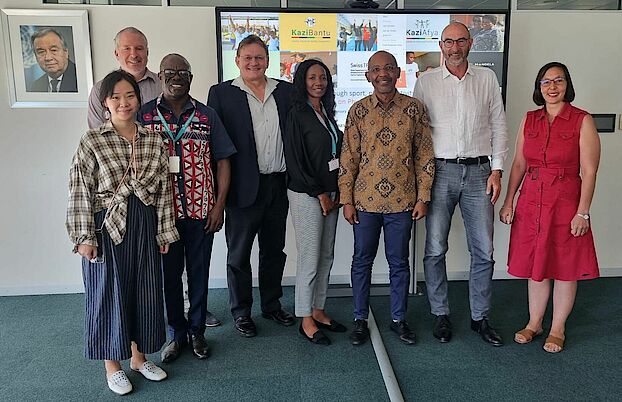At the United Nations (UN) House in Windhoek, cooperation opportunities were discussed with Mr Djaffar Moussa-Elkadhum and the UNESCO Namibia team

Participants at the meeting at UN House in Windhoek (from left to right): Ms. Yuan Xu, Junior Programme Officer, Education; Dr. Ivan Müller, Project Coordinator at UNESCO Chair, University of Basel; Mr. Ehrens Mbamanovandu, National Programme Officer for Education; Prof. Cilas Wilders, Associate Dean: Allied Health Sciences in the Faculty of Health Sciences, University of Namibia (UNAM); Mrs. Aina Heita, National Programme Officer for HIV/AIDS and Health Education; Mr. Djaffar Moussa-Elkadhum, UNESCO, Representative in Namibia/Director; Prof. Uwe Pühse, UNESCO Chair, University of Basel; Mrs. Ronelle Malan-Swart, Senior Lecturer: Allied Health Sciences in the Faculty of Health Sciences, University of Namibia (UNAM)
In cooperation with UNESCO Namibia, the KaziBantu project is being expanded with a focus on KaziKidz Pre-Primary and adapted to the Namibian curriculum
During a meeting at the United Nations House in Windhoek, cooperation was discussed with the UNESCO team Namibia under the leadership of Director Mr. Djaffar Moussa-Elkadhum, UNESCO Representative in Namibia, in connection with the development of the pre-school teaching aid KaziKidz Pre-Primary Namibia. Amongst others, internal UNESCO opportunities to strengthen cooperation were discussed to specifically address the specific national needs that have been heightened by the COVID-19 pandemic.
It was agreed to complement the existing KaziKidz levels with a teaching tool for Physical Education, Moving-To-Music and Health, Hygiene and Nutrition, which supports Pre-Primary physical activity promotion in Namibia. The aim of this supportive teaching material for Physical Education is to inspire ownership and promote sustainability within Physical Education and beyond. The curriculum is currently being developed on the basis of the UNESCO criteria for Quality Physical Education (QPE) and adapted to the local context together with experts from UNAM, UNESCO Namibia and Nelson Mandela University (South Africa). During the stay, the lessons developed by Master students from the University of Basel were tested and evaluated on site at selected schools in Windhoek. In addition, meetings were held with the NIED (National Institute for Educational Development in Namibia) and the Deans of the Health and Education Faculties. These meetings showed great support for the projects. A meeting was also held with a team from the Roger Federer Foundation (RFF) in Windhoek with the aim of exploring possibilities for cooperation in education initiatives at the pre-school level in Namibia.
